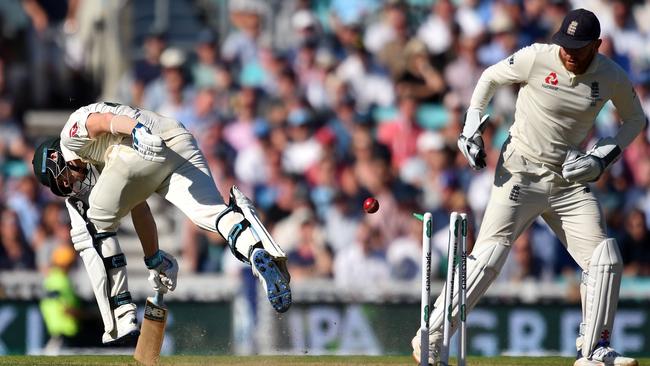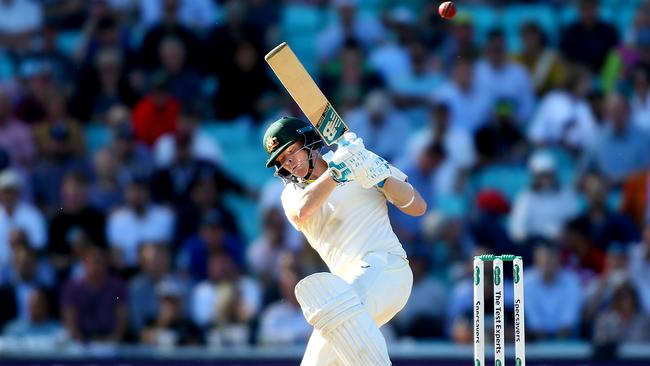
There was none of the chill and biting winds experienced in the north last week, and no searing sun, either, to weary the bones.
A full house, runs on the board, a pitch offering enough pace and bounce and Australia’s batsmen in full view. How Jofra Archer was inspired in four lengthy and impressive spells, taking six wickets for the second time in this series, as England scrapped to a healthy first-innings lead. Without Archer, and to a lesser extent the scene-stealing Sam Curran, it is a lead they would not have countenanced.
Archer’s workload is always going to be an issue for debate while he remains England’s most potent threat and while the schedule challenges players who are adept at crossing formats. At Lord’s, when he touched 96mph (154.5km/h), voices cautioned Joe Root against over-bowling this rare and precious asset.
At Manchester, as the Ashes slipped away, those same voices criticised Root for not bowling Archer more, for removing him from the attack against Steve Smith early on and so allowing Australia a foothold in the game.
Here, with time off stretching ahead of England’s players before the winter tour of New Zealand, Root let Archer fly, utilising him significantly more than any other bowler. There were seven overs for him at the start of the day, which accounted for both left-handed openers, David Warner falling cutting a wide ball, and Marcus Harris edging to second slip, where Ben Stokes took an excellent low catch. Archer’s speeds were impressive as was his accuracy and menace, and his opening spell read 7-5-7-2.
For the left-handers, it is a case of if Stuart Broad doesn’t get you, Archer will. Broad has been a nightmare for Australia’s southpaws from round the wicket, but Archer can threaten from either angle, so close to the stumps does he deliver the ball.
Mind you, the ball that got Warner was wide and unthreatening, and with eight single-figure scores in this series, he will be happy when his weary feet can make their way up the stairs of the Qantas carrier.
Archer took his leave and, as per normal, Steve Smith and Marnus Labuschagne set about restoring their position. Smith has happy memories here, having scored his maiden Test hundred in 2013, adding to that number again two years later. Labuschagne gives the impression of a man who will give his utmost in every Test match, last of the series and with the Ashes decided or not. They lunched at 55 for two, Labuschagne the more fluent of the two.
Archer’s second spell of six overs after lunch accounted for Labuschagne, beaten on the inside leg-before, shortly after taking a nasty blow on the back of the elbow.
In a moment of comedy, then, England got one over on Smith for almost the first time this summer. One over after Labuschagne’s departure, Matthew Wade drove a ball from Archer down the ground, called three runs, and as Smith ran back for a third towards the wicketkeeper’s end, his back to the ball, he saw Jonny Bairstow’s eyes widen, arms stiffen, gloves at the ready. Fearing he would be run out, Smith dived full-length to make his ground, landing in a cloud of dust at the crease.
Bairstow grinned; England’s fielders did the same, as did Smith, lying on his back, his shirt covered in muck and dirt. Instead of being thrown to Bairstow’s end, the ball had been calmly returned to the bowler, and Smith’s dive was unnecessary. Flat on his back, Smith saw the funny side, too.

There is not a club cricketer in the land who has not been stuffed by a wicketkeeper in that fashion at some stage. What was interesting, though, was the evident desperation in Smith’s dive, once he sensed danger. He often talks about his love of batting, and here was the clearest illustration of it: getting run out on this pitch? That’s a fate he could not countenance. For 20 minutes over four hours, Smith remained front and centre of Australia’s reply, passing 700 runs for the series in the process.
One thing England have not tried against him, as they have run the gamut of plans from A-Z and back again in the past two series, has been a left-arm swing bowler. There were signs in Sam Curran’s first spell that Smith took some time to adjust to this new angle of attack, as he played and missed once, and twice let the ball inadvertently cannon into his pads. He did not look certain but nor did he look vulnerable, which his partners increasingly did as Curran extracted some swing — absent until then — late in the afternoon.
There are not many days, according to the national selector Ed Smith when he first picked Curran, that the Surrey man does not have an impact upon a game, and Curran’s turn came either side of tea when he accounted for Wade, Tim Paine and Pat Cummins, the last two with consecutive balls. All three dismissals highlighted what a left-arm swing bowler can bring, with Wade too far across his crease, looking for swing that did not materialise, Paine beaten on the angle, and Cummins by swing. Curran might have had Smith, too, had clung on to a flier at slip.
Archer’s third spell of the day, one of seven overs immediately after tea, brought him his fourth wicket, when Mitchell Marsh picked out fine leg with a pull. Would Archer have swapped all four for Smith? Probably, given that for all the talk of concussions and fearsome bouncers, Smith has remained beyond Archer’s reach all summer. Instead, it fell to Chris Woakes, innocuous hitherto, to bring Smith’s vigil to an end in an unlikely manner, missing a bread-and-butter tuck to leg from a straight ball. They say he never misses them, which is why England have erred wide all summer, but that plan has hardly borne fruit, either: this score of 80 was Smith’s lowest of the series.
Archer came back for more, bowling Nathan Lyon with a slower ball and having Peter Siddle caught brilliantly in the gully by Rory Burns, six wickets no less than he deserved for his unstinting efforts. Joe Denly and Burns stretched England’s lead by nine more before the close, although to say these runs came without alarm would be a stretch: Denly, arriving late to the ground in the afternoon after the birth of his daughter, was dropped at gully, and Burns had to review a shocking leg-before — which he did with disdain — off the final ball of the day to survive.
At the start of the day, England’s score, a middling, better than it might have been but not quite as good as it should have been affair, had spectators scratching their heads: 294? What did it mean? It meant a handy first-innings lead, which, when you have been put into bat on a dry pitch, is where you want to be.
The Times






Late summer warmth settled happily on the Oval. This is the latest Test ever to be played on these English shores, which raised concerns about the potential for rain and poor weather, but conditions were perfect for a fast bowler to warm to his work.